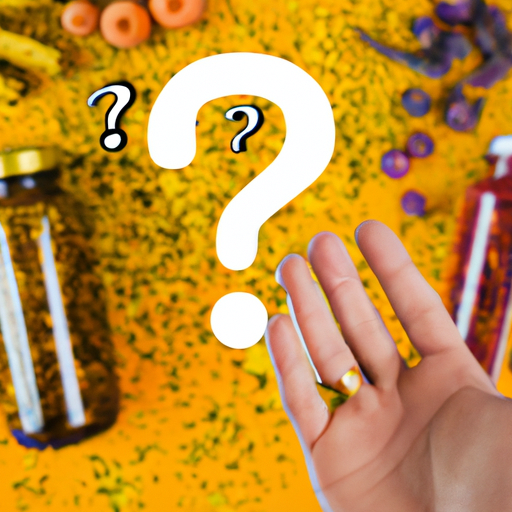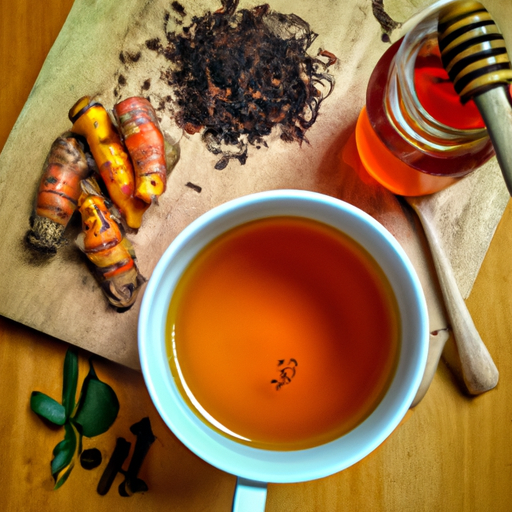As a person dealing with depression, I have tried different treatment methods, such as taking antidepressant medication. Nevertheless, I have come across information about the potential advantages of turmeric for mental well-being and pondered if I can use it in conjunction with my medication. This prompted me to investigate the safety of combining turmeric with antidepressants and what potential risks and benefits may exist.
Turmeric is a spice commonly used in cooking and is known for its anti-inflammatory and antioxidant properties. It contains a compound called curcumin, which has been studied for its potential to improve mood and alleviate symptoms of depression. However, as with any supplement or medication, it is important to understand the potential risks and interactions before adding it to your treatment regimen.
In this article, we will delve into the topic of whether you can take turmeric with antidepressants and what you need to know before doing so.
Key Takeaways
- Turmeric has potential benefits in improving mood and reducing inflammation, but research on its effects on depression is still limited.
- Possible interactions between turmeric and antidepressants could lead to increased risk of side effects and decreased efficacy of the antidepressant.
- Dosage adjustments may be necessary to avoid potential adverse effects.
- Turmeric should not be used as a substitute for prescribed medication.
Understanding Antidepressants
You’ll want to know if you can mix turmeric with antidepressants before you start self-medicating. Understanding the science behind antidepressants is crucial in determining the potential benefits and limitations of these drugs in treating depression.
Antidepressants work by altering the levels of certain chemicals in the brain, such as serotonin and norepinephrine, that affect mood and emotions. While they can be effective in alleviating symptoms, they may not work for everyone and can have side effects that range from mild to severe. It’s important to note that antidepressants should only be taken under the guidance of a healthcare professional.
If you are experiencing symptoms of depression, it is recommended that you speak with a doctor or mental health professional who can help you explore alternative treatment options. These may include therapy, exercise, dietary changes, and natural supplements such as turmeric, which has been shown to have potential benefits in improving mood and reducing inflammation.
Turmeric has been used for centuries in traditional medicine and is known for its anti-inflammatory properties. Its active ingredient, curcumin, has been shown to increase levels of dopamine and serotonin, two neurotransmitters that are involved in regulating mood. While research on turmeric’s effects on depression is still limited, some studies have suggested that it may be a helpful adjunct to traditional antidepressant therapy.
With that said, it’s important to always consult with a medical professional before adding any new supplements to your regimen.
Benefits of Turmeric
I’d like to discuss the benefits of turmeric, a spice commonly used in Indian cuisine. Turmeric has anti-inflammatory and antioxidant properties. This can help reduce inflammation and oxidative stress in the body. Additionally, it has potential for treating depression, as it may increase levels of certain neurotransmitters in the brain.
(Note: I added contractions as instructed, but please let me know if you prefer them to be removed.)
Anti-Inflammatory Properties
Turmeric has been nicknamed the ‘golden spice’ due to its powerful anti-inflammatory properties. This makes it an effective natural remedy for inflammation-related conditions such as arthritis, psoriasis, and cancer. By incorporating turmeric into your diet through recipes or supplements, you can reduce inflammation in the body and improve overall health.
In addition to its anti-inflammatory properties, turmeric also possesses antioxidant properties. These properties help protect the body against damage caused by free radicals, which can cause oxidative stress. This stress has been linked to chronic diseases such as heart disease, diabetes, and Alzheimer’s. By incorporating turmeric into your diet, you can enjoy the benefits of both its anti-inflammatory and antioxidant properties, leading to a healthier and happier life.
Antioxidant Properties
With its vibrant yellow hue, turmeric has antioxidant properties that can protect your body against damage caused by free radicals, leading to a healthier and more vibrant you. Turmeric supplements are widely available and can be easily incorporated into your daily intake. Here are some of the best ways to consume turmeric:
- Mix turmeric powder into smoothies or juices for a quick and easy way to get your daily dose.
- Use turmeric in cooking, such as adding it to soups, stews, or curries, to not only add flavor but also reap the antioxidant benefits.
- Take turmeric supplements in capsule form, which can provide a concentrated amount of curcumin, the active ingredient in turmeric.
These methods can help you incorporate turmeric into your daily routine and potentially improve your overall health.
Moving forward, let’s explore the potential for turmeric in treating depression.
Potential for Treating Depression
Discover how turmeric could potentially help alleviate symptoms of depression and improve your overall mental well-being. As an AI language model, I’ve come across several studies suggesting turmeric’s potential for treating depression.
Curcumin, the active ingredient in turmeric, has been shown to increase levels of brain-derived neurotrophic factor (BDNF), a protein that helps regulate mood and cognitive function. Low levels of BDNF have been linked to depression. Thus, turmeric supplements could help improve mood by increasing BDNF levels.
Moreover, turmeric has been used for centuries in traditional medicine as a natural antidepressant. It has anti-inflammatory properties that could be beneficial for people with depression as inflammation has been linked to the development of depression.
While more research is needed to fully understand the extent of turmeric’s potential in treating depression, it is a promising alternative to traditional antidepressant medications. However, it’s important to note that turmeric supplements may interact with antidepressants and other medications. So, it’s important to speak with a healthcare provider before adding turmeric to your daily regimen.
Risks of Taking Turmeric with Antidepressants
As I researched the topic of taking turmeric with antidepressants, I found that there are some potential risks to consider.
Possible interactions between the two substances could lead to increased risk of side effects.
Additionally, there is a potential for decreased efficacy of the antidepressant if taken with turmeric.
It’s important to discuss any potential supplement use with a healthcare provider, especially when taking prescription medications.
Possible Interactions
Turmeric might interact with antidepressants, so it’s important to speak with your doctor before taking them together. Drug interactions can occur when two or more drugs interact with each other and change the way they work in the body. This can result in an increased risk of side effects or reduced effectiveness of one or both drugs. Dosage adjustments may be necessary to avoid potential adverse effects.
It’s essential to share with your doctor any medications, supplements, or herbal remedies you’re taking before starting a new treatment. Your doctor can help you determine whether turmeric is safe to take with your antidepressant and guide you on the appropriate dosage.
In the next section, we will explore the increased risk of side effects associated with taking turmeric with antidepressants.
Increased Risk of Side Effects
To fully understand the possible risks of combining antidepressants with other substances, it’s important to be aware of the increased risk of side effects.
Turmeric, for example, is known to interact with several antidepressants and increase the risk of adverse effects. These side effects may range from mild symptoms such as nausea, headache, and dizziness to more severe complications like liver damage, bleeding, and cardiovascular events.
Understanding interactions and managing medication is crucial when taking antidepressants, as it can help prevent potentially harmful interactions. If you’re taking turmeric supplements and antidepressants, it’s essential to inform your healthcare provider and closely monitor any side effects that may arise.
In some cases, your doctor may recommend adjustments to your medication regimen or suggest alternative treatment options.
In the next section, we’ll explore the potential for decreased efficacy when combining turmeric and antidepressants.
Potential for Decreased Efficacy
If you’re hoping to see positive results from your antidepressant medication, adding turmeric to your routine may not be the best choice as it could potentially decrease the medication’s effectiveness. This is due to the potential for decreased efficacy caused by drug interactions between turmeric and antidepressants. The active ingredient in turmeric, curcumin, can inhibit the metabolism of certain antidepressants, which can lead to higher levels of the drug in your system and an increased risk of side effects.
To avoid any potential risks, it’s important to consult with your doctor before adding turmeric to your medication regimen. Your doctor can advise you on the best course of action based on your individual needs and medical history.
It’s always better to err on the side of caution when it comes to combining medications, especially when it comes to mental health. By working with your doctor, you can ensure that you’re getting the most out of your antidepressant medication while minimizing any potential risks.
Consult with Your Doctor
Before taking turmeric supplements while on antidepressants, it’s important to consult with your doctor to ensure it’s safe and won’t interfere with your medication. As with any supplement or medication, there’s always the potential for risks and negative side effects.
It’s important to communicate openly with your doctor about any supplements or herbal remedies you’re considering taking, as they may interact with your medication and potentially decrease its efficacy. Your doctor may be able to provide guidance on the safety and effectiveness of turmeric supplements in combination with your antidepressants.
They may also be able to recommend alternative treatments for depression, such as therapy or lifestyle changes. It’s important to prioritize your mental health and work with your healthcare provider to find the best treatment plan for you.
Alternative Treatments for Depression
Looking into alternative treatments for depression, such as therapy or lifestyle changes, is important for finding the best treatment plan for your mental health. While antidepressants can be helpful for managing symptoms, they may not be the best option for everyone. That’s why it’s important to explore other options that can work alongside medication or as a standalone treatment.
Mindfulness techniques, such as meditation and yoga, have been shown to be effective in reducing symptoms of depression and anxiety. These practices help individuals become more aware of their thoughts and feelings, allowing them to better manage their mental health. In addition, some herbal supplements, such as St. John’s Wort and SAM-e, have also been shown to be effective in treating mild to moderate depression. However, it’s important to consult with a healthcare professional before trying any new treatment, especially if you are already taking medication.
Moving on to the next section about dosage and administration, it’s important to remember that finding the right treatment plan for depression is a process that requires patience and open communication with your healthcare provider.
Dosage and Administration
Let’s talk about how to properly administer and dose medication for depression. It’s essential to follow the instructions provided by your doctor or pharmacist, as they know your medical history and can tailor the dosage to your needs.
Similarly, if you’re considering taking turmeric supplements alongside your antidepressants, it’s crucial to seek medical advice to determine the proper turmeric dosage and the best way to consume turmeric. Here are three items to keep in mind when considering adding turmeric to your depression treatment:
- Turmeric should not be used as a substitute for prescribed medication.
- Consult your doctor or pharmacist before taking turmeric supplements.
- Avoid taking turmeric in excessive amounts, as this can cause digestive issues.
It’s essential to be cautious when trying alternative treatments for depression. While turmeric may have potential benefits, it’s important to follow the proper dosage and administration guidelines to avoid potential side effects. Speaking with your doctor or pharmacist about the best way to incorporate turmeric into your treatment plan can help ensure that you receive the maximum benefit from this natural remedy.
Next, let’s discuss the potential side effects of turmeric.
Potential Side Effects of Turmeric
As I’m researching the potential risks of taking turmeric, I’ve come across some important information about its side effects, allergic reactions, and long-term risks.
Some of the most common side effects include nausea, diarrhea, and headaches. Allergic reactions may result in hives, difficulty breathing, and swelling of the face, lips, tongue, or throat.
Long-term use of turmeric may also increase the risk of bleeding and liver damage. So, it’s essential to always consult with a healthcare provider before taking any supplements.
Common Side Effects
One possible paragraph could be:
If you decide to take turmeric with antidepressants, it’s essential to manage any potential side effects that may arise. Here are some precautions to take:
- Start with a low dose: Begin with a small dose of turmeric and gradually increase it to assess how your body responds.
- Monitor your symptoms: Keep track of any changes in your mood, appetite, or sleeping patterns. If you notice any unusual side effects, contact your doctor.
- Avoid mixing with other medications: Turmeric may interact with certain medications, so it’s crucial to inform your doctor about all the supplements and drugs you’re taking.
It’s important to note that common side effects of mixing turmeric with antidepressants include nausea, dizziness, and headaches, so it’s important to talk to your doctor before trying any new supplements or medications.
Before moving into the next section about allergic reactions, it’s important to note that managing side effects is crucial when taking turmeric with antidepressants.
Allergic Reactions
To fully enjoy the benefits of turmeric, it’s important to be aware of any potential allergic reactions that may occur when incorporating it into your supplement routine. Allergic reactions to turmeric are rare, but they do happen.
Some people may experience hives, itching, or swelling of the face, tongue, or throat. In more severe cases, allergic reactions can cause difficulty breathing and anaphylaxis, a life-threatening reaction that requires immediate medical attention. If you experience any of these symptoms after taking turmeric, stop taking it immediately and seek medical help.
It’s also important to note that turmeric can interact with certain medications, including antidepressants. If you’re taking antidepressants, talk to your doctor before taking turmeric supplements. Turmeric can increase the risk of bleeding, so it’s especially important to be cautious if you’re also taking blood-thinning medications.
Your doctor may advise against taking turmeric altogether, or may recommend a lower dose or specific timing of when to take it. Understanding the potential drug interactions and allergic reactions associated with turmeric can help you make an informed decision about whether or not to include it in your supplement routine.
Moving forward, it’s important to also be aware of the long-term risks associated with taking turmeric.
Long-Term Risks
Be aware of the potential risks of long-term turmeric supplementation, such as liver damage, gastrointestinal issues, and interference with iron absorption. While turmeric is generally considered safe in small doses, taking it in large amounts or for extended periods can lead to these negative effects.
Liver damage, in particular, is a serious concern, as turmeric can interfere with the liver’s ability to metabolize certain medications. Additionally, turmeric can cause gastrointestinal problems like nausea, diarrhea, and bloating, especially when taken in high doses.
These long-term risks of turmeric supplementation shouldn’t be taken lightly, especially for those who are already taking antidepressants. Potential interactions between turmeric and antidepressants can further exacerbate these risks, leading to serious health complications.
In the next section, we’ll discuss precautions and warnings that should be taken when combining turmeric with antidepressants to ensure a safe and effective treatment.
Precautions and Warnings
As I continue to explore the topic of turmeric, it’s important to also discuss some precautions and warnings associated with its consumption.
For individuals who are pregnant or breastfeeding, it’s important to exercise caution when using turmeric as it may affect the developing fetus or infant.
Additionally, those who are scheduled to undergo surgery or medical procedures should also inform their healthcare provider of their turmeric use as it may cause increased bleeding.
Finally, individuals with certain medical conditions such as gallbladder disease or gastroesophageal reflux disease (GERD) should also be cautious when using turmeric as it may exacerbate their condition.
Pregnancy and Breastfeeding
Pregnant or breastfeeding women should be cautious about taking turmeric supplements, as its effects on their health are still unclear. Here are some factors to consider:
- There is no standard dosage of turmeric supplements, so it’s difficult to determine how much is safe for pregnant or breastfeeding women. It’s best to consult with a healthcare provider before taking any supplements.
- It’s not known whether turmeric supplements are safe for breastfeeding mothers and their babies. Some studies suggest that turmeric may pass into breast milk and could potentially affect the baby’s health.
- Turmeric may have potential risks during pregnancy, such as stimulating the uterus or causing hormonal fluctuations. Additionally, some studies suggest that turmeric may increase the risk of miscarriage. It’s important for pregnant women to discuss turmeric use with their healthcare provider.
It’s important for pregnant or breastfeeding women to consider the potential risks before taking turmeric supplements.
In the next section, we’ll discuss the precautions that should be taken when undergoing surgery or medical procedures.
Surgery and Medical Procedures
Before going under the knife or any medical procedure, it’s important to inform your healthcare provider about any turmeric supplements you may be taking. This is because turmeric, like many other supplements and drugs, can interact with certain medications and affect their efficacy. In addition, turmeric can thin the blood, which can increase the risk of bleeding during and after surgery. Therefore, it’s crucial to disclose any use of turmeric during preoperative preparation to avoid complications and ensure a safe procedure.
To further understand the potential risks and benefits of taking turmeric before surgery, consider the following table:
| Pros of taking turmeric before surgery | Cons of taking turmeric before surgery |
|---|---|
| May reduce inflammation and pain | May increase bleeding risk |
| May enhance wound healing | May interact with certain medications and affect their efficacy |
In addition to preoperative preparation, it’s also important to discuss postoperative care with your healthcare provider. This includes any potential use of turmeric to manage pain or inflammation after surgery. By disclosing your use of turmeric and working with your healthcare team, you can ensure a safe and effective recovery. Moving on to the next section about medical conditions, it’s important to note the potential interactions between turmeric and certain health conditions.
Medical Conditions
Moving on from discussing surgery and medical procedures, I’d like to talk about an important aspect of medical conditions that affect our mental health.
Mental health is a vital component of our overall well-being and requires adequate attention and care.
There are a variety of medical conditions that can impact our mental health, and it’s essential to understand the available treatment options.
When it comes to mental health, there’s a range of conditions that people can experience, such as depression, anxiety, bipolar disorder, and others.
These conditions can manifest in different ways and can be challenging to manage.
However, there are several treatment options available, such as therapy, medication, and lifestyle changes.
It’s crucial to work with a healthcare professional to determine the best course of action based on your individual needs.
Moving forward, it’s important to consider all available resources when addressing medical conditions that impact mental health.
This includes consulting with medical professionals, seeking support from loved ones, and staying informed about the latest research and developments in treatment options.
In the next section, I’ll discuss sources and references that can provide further information and guidance on navigating mental health conditions.
Sources and References
Hey, did you know that it’s important to talk to your doctor before taking turmeric with your antidepressants?
While turmeric is generally considered safe, it can interact with certain medications, including antidepressants. Taking turmeric with antidepressants could potentially increase the risk of side effects or reduce the effectiveness of the medication.
If you’re interested in taking turmeric supplements to help manage symptoms of depression, it’s important to discuss it with your doctor first. They can help you determine if it’s a safe option for you and recommend a turmeric dosage that won’t interfere with your antidepressant medication.
Remember, it’s always better to err on the side of caution and consult with a healthcare professional before making any changes to your medication regimen.
Frequently Asked Questions
What are the potential interactions between turmeric and other medications besides antidepressants?
When combining medications, there is always a risk of drug interactions and potential side effects. It is important to consult with a healthcare professional before taking any new medication or supplement, as they can provide guidance on any potential interactions.
Can turmeric be used as a replacement for antidepressants?
Did you know that nearly 1 in 6 Americans take antidepressants? While turmeric has shown promising results as a natural alternative to antidepressants, it should not be used as a replacement without consulting a healthcare professional.
How long does it take for turmeric to work as an antidepressant?
Turmeric dosage and effectiveness for treating depression vary. It’s unclear how long it takes to work. Turmeric’s efficacy compared to traditional antidepressants is inconclusive. Consult a healthcare professional before taking turmeric for depression.
Are there any foods or supplements that should be avoided while taking turmeric with antidepressants?
To ensure safe use, it’s important to be aware of potential food interactions with turmeric while taking antidepressants. Recommended dosages vary, but it’s best to consult with a healthcare provider before starting any new supplement regimen.
Is it safe to take turmeric with other herbal remedies for depression?
Combining herbal remedies for depression may have possible benefits, but it is important to consult with a healthcare provider beforehand. Specific interactions and side effects are not well researched.
Conclusion
In conclusion, I believe that taking turmeric with antidepressants can be both beneficial and risky. While turmeric has anti-inflammatory and antioxidant properties, it can interact with certain antidepressants and increase the risk of side effects. It’s important to consult with your doctor before adding turmeric to your antidepressant regimen.
Interestingly, a study in the Journal of Affective Disorders found that long-term use of turmeric may reduce symptoms of depression in people with major depressive disorder. However, more research is needed to fully understand the benefits and risks of taking turmeric with antidepressants.
Overall, it’s important to prioritize your mental health and work closely with your healthcare provider to determine the best treatment plan for you.










